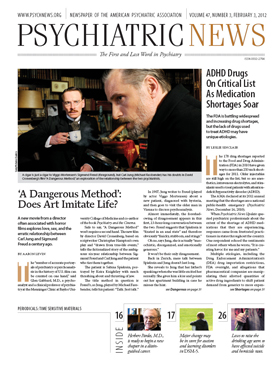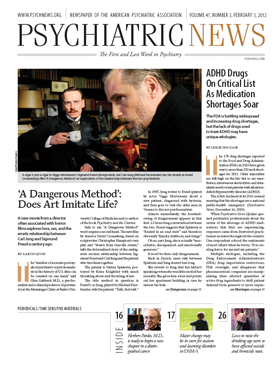A review of 44 published studies finds that rates of mental health problems among women with unwanted pregnancies are equal regardless of whether they gave birth or had an abortion.
The analysis was “the world’s largest, most comprehensive, and systematic review into the mental health outcomes of induced abortion,” said the National Collaborating Centre for Mental Health at Britain’s Royal College of Psychiatrists, which produced the 252-page document.
The report focused on legal abortions for unwanted pregnancies with validated mental health outcomes assessed at least 90 days following abortion or delivery.
“Our review shows that abortion is not associated with an increase in mental health problems,” said Roch Cantwell, M.B.B.Ch., a consultant perinatal psychiatrist at Southern General Hospital, Glasgow, and chair of the study’s steering group, in a statement accompanying the report’s release.
“The report is a very careful, meticulous, objective study,” said former APA president Nada Stotland, M.D., M.P.H., a professor of psychiatry and obstetrics/gynecology at Rush Medical College in Chicago, in an interview. “It is a very welcome answer to massive amounts of misinformation.”
Stotland was referring to a September 2011 article in the British Journal of Psychiatry (BJP) concluding that “women who had undergone an abortion experienced an 81 percent increased risk of mental health problems, and nearly 10 percent of the incidence of mental health problems was shown to be attributable to abortion.”
However, that article by Patricia Coleman, Ph.D, a professor of human development and family studies at Bowling Green State University in Ohio, has been heavily criticized as methodologically flawed and biased by many (including Stotland and another former APA president, Carol Nadelson, M.D.) on the BJP Web site.
Making a moral case against abortion was legitimate, but objecting to it by falsely claiming that it causes mental illness or breast cancer was misleading, said Stotland. “We must stand up for scientific truth wherever psychiatry is being misused.”
A history of mental health problems before the abortion most strongly predicted having similar problems after an abortion, said the report.
The same was true for women who gave birth: “[T]he most important risk factor for poor mental health following a live birth was a history of mental health problems both before and during the pregnancy.”
However, the direction of the association was not clear, said the reviewers.
“[W]e cannot be sure whether the unwanted pregnancy is the result of mental health problems; or that an unwanted pregnancy leads to mental health problems; or, indeed, that some other factors, such as intimate partner violence, may lead to both mental health problems and an unwanted pregnancy,” they wrote.
Life events, pressure from a partner to have an abortion, or negative feelings about abortions may also contribute to postabortion mental health problems.
In conclusion, the report suggested that women with a history of mental health problems may need appropriate monitoring and support regardless of whether they have an abortion or give birth.
The authors also suggested that future practice and research should focus on the mental health needs associated with an unwanted pregnancy, rather than on the resolution of the pregnancy.

